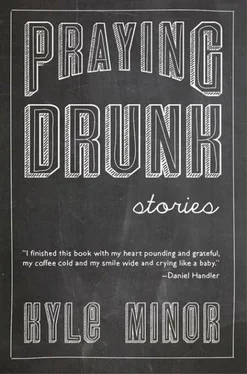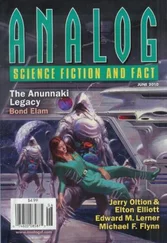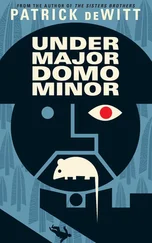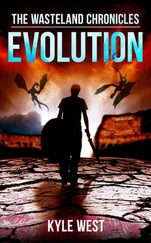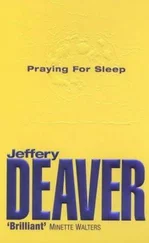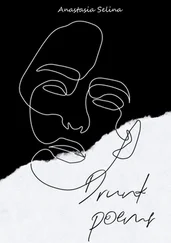A skinny black cat, a stray, moves into our garage, and my wife begins to feed it. At night, the cat prowls. We hear her at night with the neighborhood tomcats, and soon she is pregnant, and my wife feeds it and feeds it, and the cat grows fat and less weary and lets my wife pet it. Our own baby cries all the time. The cat gives birth to three babies in our garage. One day I have our baby by myself all morning, and all morning he will not stop crying. They used to call this condition colic, but colic seems too benign a word for what this constant crying does to the nervous system of an adult. The only thing that will quiet him is to put him in the car and drive him around town until he stops crying. In a state of agitation, I take him outside and put him in the car seat and start the car as quickly as I can and back out the driveway, but something doesn’t feel right, some little wobble on the driver’s side. I stop the car and open the door. One of the baby kittens is crushed under the front wheel on the driver’s side. It is still alive and mewling. One robin-blue eye is popped from its socket. The other kittens come toward the crushed kitten. The kittens are crying. My baby is crying. The mother cat arrives from the woods where she was foraging. The mother cat is crying. I want to move the car off the dying kitten, but I am afraid I will crush more kittens. Nobody has punched me in the kidneys, but that is what it feels like in my back. I’m doubled over, smelling the kitten. I vomit in the grass. There is a pressure in my sinuses. The mother cat is licking the dying kitten, pushing at its head, pushing its eyeball back toward the socket too crushed to hold it. Cultivated people manufacture their own words for moments — right? — but all I hear is a buzzing, and in my mouth the taste of pennies triggers the sense memory of Ralph Stanley’s voice singing “O Death,” and there’s the smell of amniotic fluid somehow and something in the muscles at the back of my arms and legs like when bigger boys used to beat me in the locker room with those puke-green walls when I was twelve, except now I’m responsible for the baby crying in my car, and I’m responsible for this kitten now dead under the wheel of my car.
I call my wife, and she is in a meeting, and sends her assistant, who brings me a Coca-Cola and offers to move the car and offers to move the dead kitten. All afternoon, the mother cat stands over the dead kitten. When my wife gets home, she feeds our baby. Then she takes a shovel and buries the dead kitten. For three days afterward, the mother cat stands over the place where the kitten is buried and paws at the ground and cries for it. She hides her other kittens in the wooded lot by our garage and doesn’t let us see them anymore. She takes our food, but only when we are not around to see her take it. She gets skinny again.
The phone rings. Kentucky. My wife’s nineteen-year-old nephew. His mother and father have separated. He’s with his father in the ramshackle house in the middle of the Daniel Boone National Forest. He has locked himself in his room and won’t come out. He has ingested nothing but Jack Daniels for three days. He is prostrate confessing his sins to God. He has been found passed out, dehydrated. He has been taken to the hospital. The phone rings. The boy again. He has been taken to Arizona. Some kind of cult deprogramming facility where they cast out demons. The phone rings. He has escaped the facility by foot. He has been found under an overpass, dehydrated. The facility won’t keep him if he doesn’t want to stay. The demons haven’t been successfully cast out. They’re sending him home to his father and the ramshackle house. The phone rings. The boy’s father was in the shower. He didn’t hear the boy go out. The boy went up into the clearing on the hill with the shotgun. He put the shotgun in his mouth and he pulled the trigger. He took one of his drums up there with him. They found his body up there with the cracked drum skin. “Would you please tell your wife?”
I tell my wife. We pack our things and drive straight to Kentucky. At the funeral service, the preacher mixes together the bitter ingredients that make sweet biscuits, then eats a biscuit, and says the sweet life is made of bitter parts.
There is an argument about flowers after the service. The boy’s maternal grandmother doesn’t want anybody from the boy’s father’s family to take any of the good flowers home. Blame is in the air, and the smell of biscuits. After the service, we go back to the ramshackle house. The boy’s mother’s pink piano is missing. The boy’s father says he and the boy hauled it out and threw it off the porch and took an axe to the wood. There is some talk about the axe splitting a tension string and the string cutting a stripe the length of a forearm. Inside the house, shellacked wasps have been affixed near the eyes of all the mother’s Precious Moments figurines. In the bathroom, the boy’s father grinds up methadone pills and snorts them in lines. His pupils are pinpricks. I ask for the bathroom. I feel full of death and want to purge. I shit and wipe and throw the paper into the toilet and the toilet stops up. The boy’s father comes into the bathroom and says it’s all right and plunges the toilet and makes the shit and paper go down. He says it’s all right again, then goes outside in his overalls and leans against the building and smokes a cigarette. The bottle of Jack Daniels is in his hand, and I wonder: Is that the bottle? Is that the one the boy took into the bedroom?
In the farmhouse down the gravel road from the ramshackle house, the extended family gathers for what will be the last time, though we don’t know it yet, how this fissure was one fissure too many, and so many of us have young families and maybe we don’t want to infect one another, and maybe this extended family has become suspect on grounds of infection, although, to me, the taint is on everything, here and everywhere else, too. I ought to be paying attention to my wife. It’s her family. But all I can pay attention to is the ratcheting up of the tension inside myself, the grief upon grief upon grief that stacks up so time gets distorted and I can’t remember which death came first, or which in what order, not even now while I’m committing these things to paper.
In Kentucky I try to call my brother, but we are in a hollow the cell phone companies haven’t valued enough to send a signal. I drive into town to call my brother, but the battery runs out, and none of the local convenience stores sell the right charger. So many times I have called him because I was worried about him, but this is the first time I have called him because I need him to be worried about me. Back at the farmhouse and the ramshackle house, everyone says the same empty words they always say about heaven and God and the way all things work together for good. I have heard them so many times, but now what they mean to me is that life is empty of meaning so people must tell themselves stories about how and in what ways everything means.
These words don’t seem to comfort anyone so much, anyway. All the men of my wife’s family are outside pushing the lawnmower or building a dam for the creek or whatever kind of physically vigorous thing they can find to do to keep death or the news of death at arm’s length, and the children are running around with the dogs, and the women are in the kitchen baking things and cleaning things, and one of them is whistling to ward off silence. That’s the only reason I can figure for her whistling.
Night can’t come soon enough, and when it does, I beg my wife to drive tomorrow to my brother’s house in Nashville. She says let’s go now and we’ll buy a battery in Lexington and call him from the interstate. We arrive around four in the morning, and he greets us. He is waiting for us. He has known his share of trouble like we have, and now he offers his bedroom. He has drawn the curtains and he has pulled the nightshade. My wife and child lie down in his bed and go to sleep. My brother and me go upstairs to his studio. We throw our bodies onto those beanbag chairs where we’ve thrown our bodies before, under similar circumstances. There is a documentary on the TV about stone altars in Indonesia, and we watch it with the sound off. The pattern randomizer bounces lines and shapes across a spectrum of bright colors on the monitor beside the TV. All around us, the chalkboard walls and the soundproofing foam and the guitars and the keyboards and all the rack-mounted gear and the computers and the mixing consoles, and next to me, my black bag, with my laptop and my red Cheever book to jump-start language, all the tools with which we’re supposed to make meaning or offer pleasure or at least make somebody feel something, but where are we supposed to start finding any of it?
Читать дальше
